Ukraine desperately needs more soldiers. War amputees are returning to the frontline
‘Even though I can’t sit inside a tank, I can still be useful. I can still fight a bit’
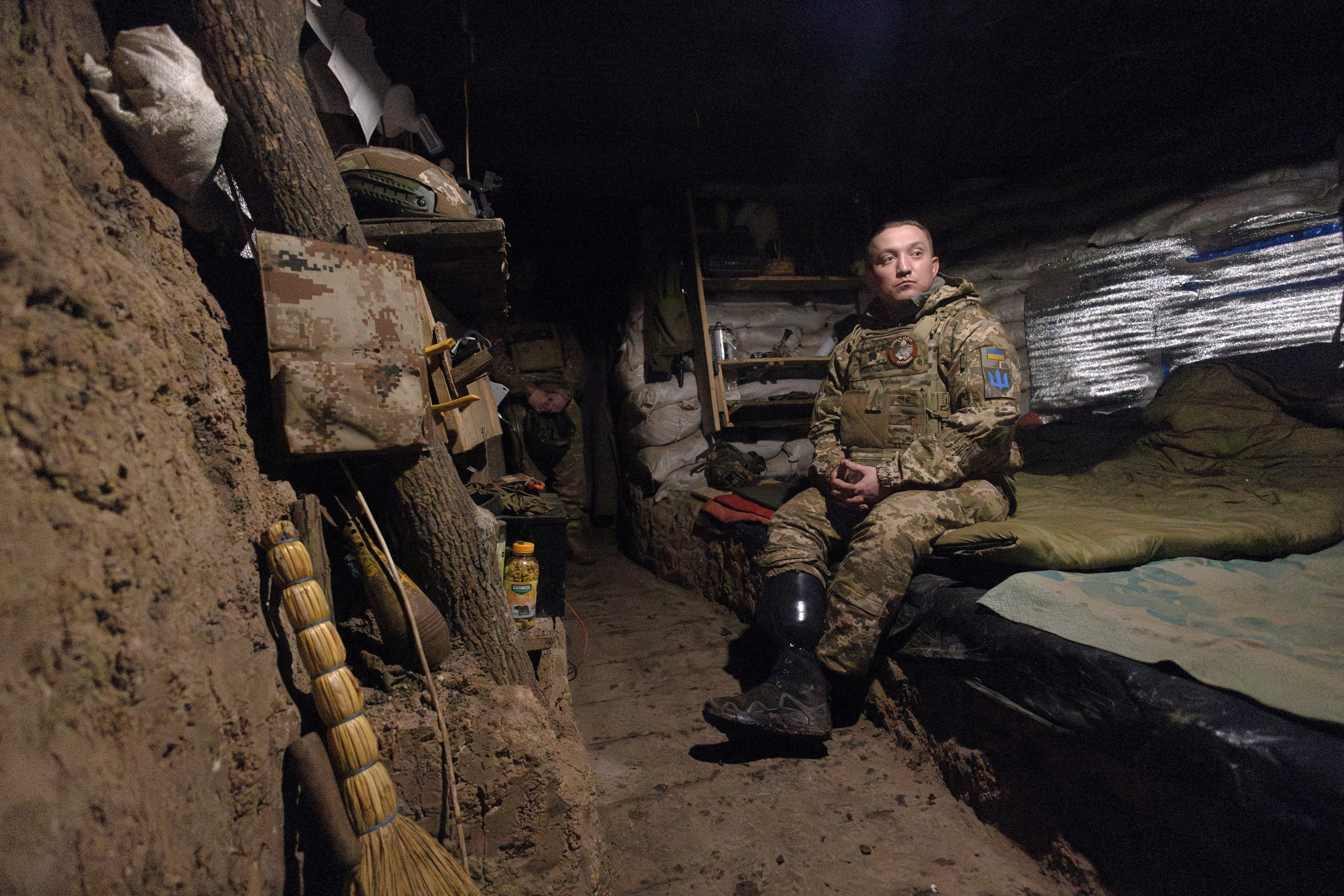
Your support helps us to tell the story
From reproductive rights to climate change to Big Tech, The Independent is on the ground when the story is developing. Whether it's investigating the financials of Elon Musk's pro-Trump PAC or producing our latest documentary, 'The A Word', which shines a light on the American women fighting for reproductive rights, we know how important it is to parse out the facts from the messaging.
At such a critical moment in US history, we need reporters on the ground. Your donation allows us to keep sending journalists to speak to both sides of the story.
The Independent is trusted by Americans across the entire political spectrum. And unlike many other quality news outlets, we choose not to lock Americans out of our reporting and analysis with paywalls. We believe quality journalism should be available to everyone, paid for by those who can afford it.
Your support makes all the difference.Ukrainian commander Odin’s lower leg was blown off in a mine explosion last year. He’s now back in the trenches.
“I had offers to go back to my local academy as a teacher or to work at a draft office in Odesa,” the 32-year-old from the 28th Separate Mechanised Brigade said from a cramped bunker on the front line in the eastern region of Donetsk.
“I said I’m not interested in these positions.”
Mango, a 28-year-old tank gunner, saw his hand shredded by shrapnel two years ago during fighting in Mariupol before he was captured by the Russians. He too has returned to the front, as logistics chief for a battalion in the Azov Brigade, which held out for months in defence of the southern city.
Ukraine’s drained and depleted army needs all the help it can get. It is being driven back by its far larger, more powerful enemy around the eastern city of Avdiivka while coming under increasing pressure at other sections of the front.
“When I got back from captivity, I realised the war wasn’t over,” said Mango, who like Odin and most Ukrainian soldiers goes by his military call sign for security reasons.
“Even though I can’t sit inside a tank, I can still be useful. I can still fight a bit.”
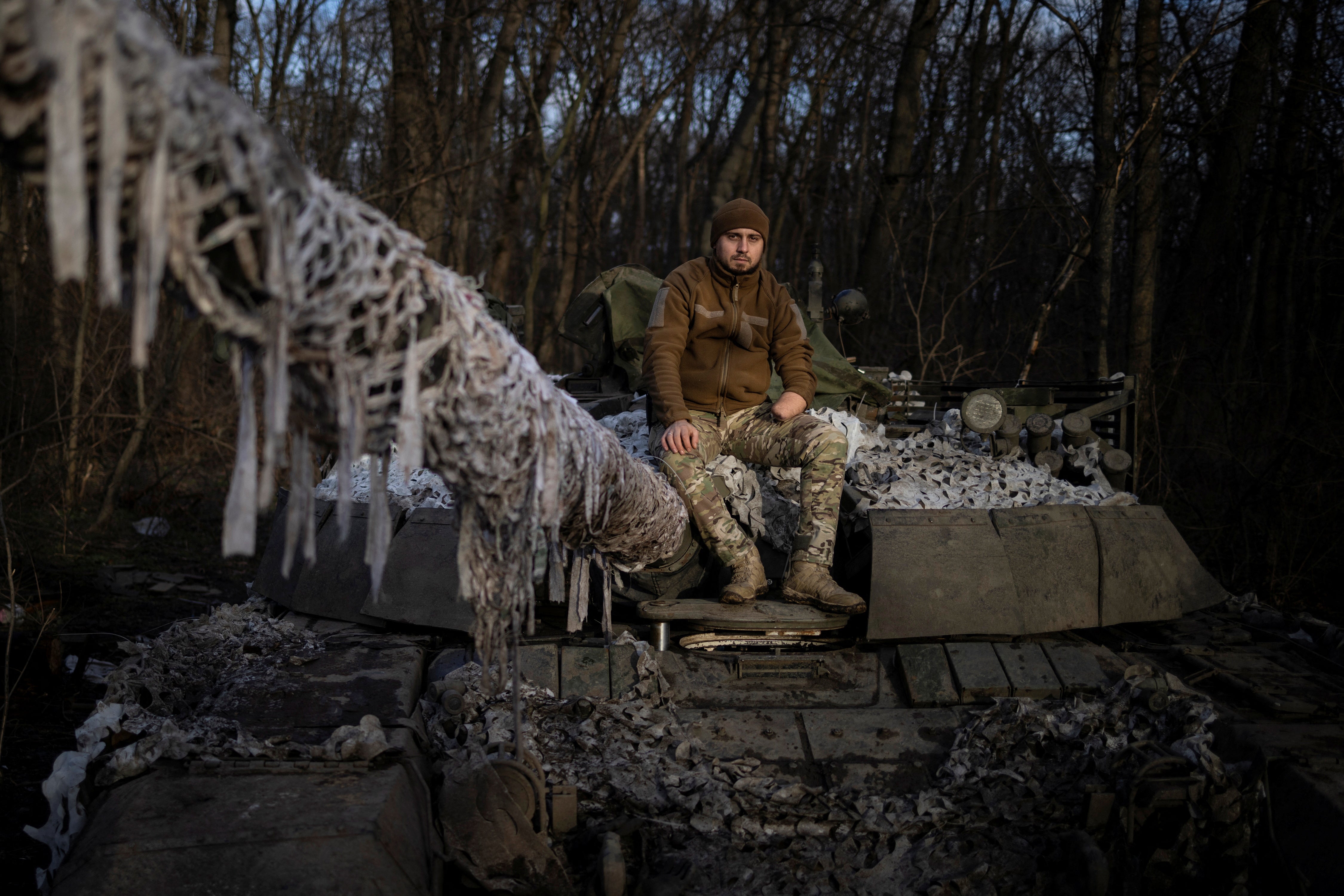
The two soldiers are among thousands of Ukrainian troops who have lost limbs since Russia launched a full-scale invasion in early 2022. While the Kyiv government declined to share data on casualties, which it deems sensitive, Pryncyp, a leading human rights organisation representing military personnel, put the number of amputees from the war at between 20,000 and 50,000.
Battlefields are littered with mines, while artillery and drone attacks are a constant menace, meaning the grim number is rising steadily.

Reuters interviewed 20 military amputees for this article, seven of whom had returned to the army or intended to do so. For many of those able to do so, the desire to support their beleaguered comrades on the battlefield remains strong.
Masi Nayyem, co-founder of Pryncyp, said it was fairly common to see soldiers with artificial limbs still serving, though he didn’t know how many had returned to the military and how many had entered civilian life.
The nature of their role will often be decided by the extent of the injuries, said Nayyem, who lost an eye in combat in June 2022. Soldiers with amputations below the knee, for example, are often deemed fit for service in support units but not for highly mobile or specialized roles, according to Pryncyp.
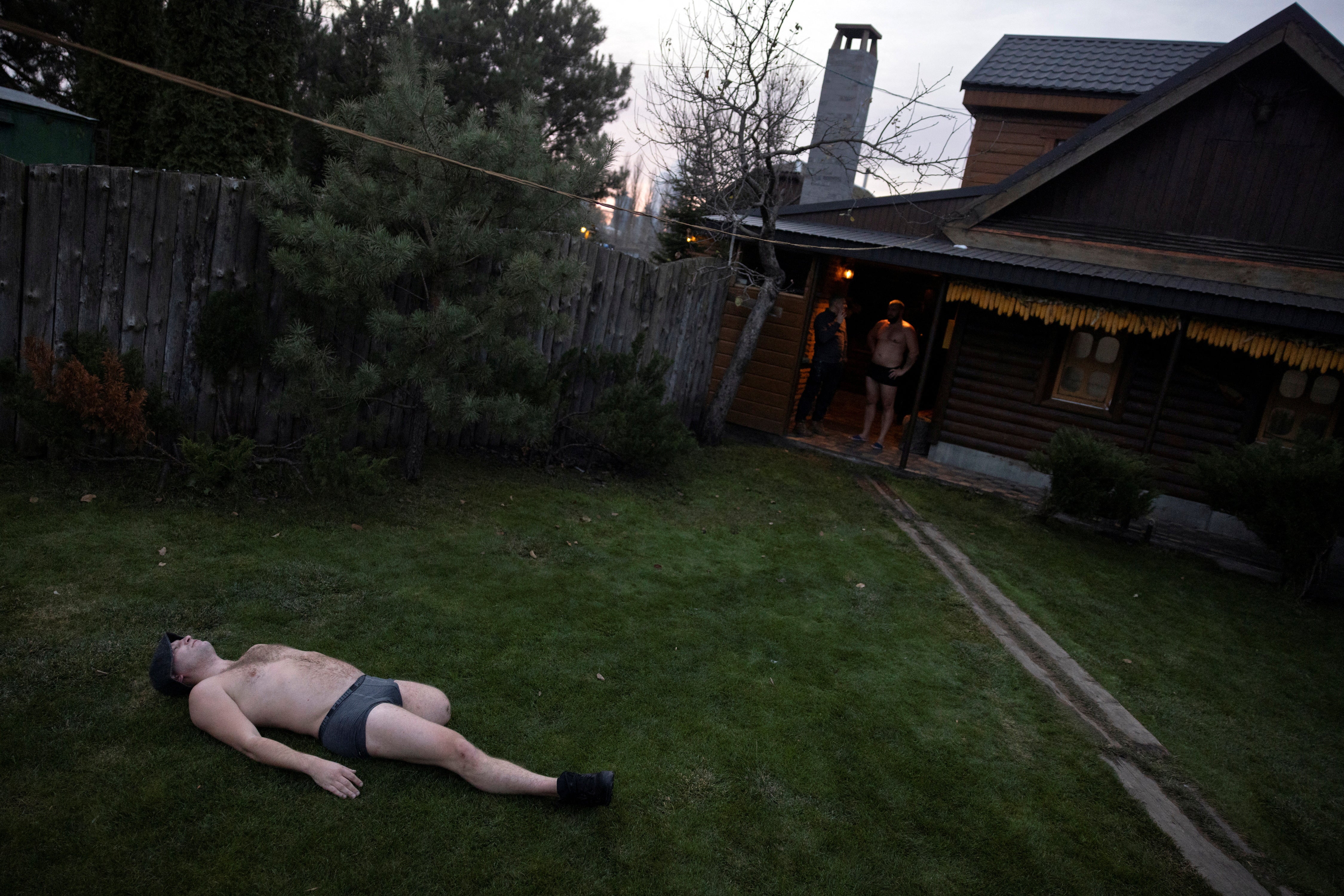
Tony Bloomfield, operations director at the British military charity for limbless veterans Blesma, said it was generally extremely rare for soldiers who have lost a limb to return to the conflict, but that this was happening in Ukraine.
“The nature of the conflict is leaving lots of limb loss,” said Bloomfield, whose team has spent time with wounded Ukrainian soldiers to help them adapt to limb loss, adding that artillery barrages were a major cause of the injuries.
“Some of the Ukrainians we met, yes absolutely they want to go back and fight if they’re able to,” he said. “The difference here again, for Ukraine, is that if you leave the military, your country is still at war. And you’re still at risk of injury.”
‘My hand wasn’t there anymore’
Kyiv is desperate to replenish its ranks.
Soldiers say they are outnumbered and outgunned along the 1,000-km front line in the east and south of Ukraine. During Moscow’s months-long assault on Avdiivka, some Ukrainian troops said they had been outnumbered by around seven to one.
President Volodymyr Zelenskiy signed a bill this month to lower the draft age from 27 to 25, while a mobilisation bill aimed at drafting potentially hundreds of thousands more troops has made its way only slowly through parliament.
Both Odin and Mango - career soldiers who were in the military before the Russian invasion - expressed a sense of responsibility for the soldiers they had left behind in the trenches and of guilt that they had survived their injuries and could live in relative safety away from the fighting.
Odin had little hesitation in asking superiors for permission to return to combat after he had undergone surgery and rehabilitation with a prosthetic limb.
At his mortar position in Donetsk, he moves freely up and down the trenches, speaking with members of his unit and giving orders. But he says he still has an intense fear of triggering a mine again as he fights Russian forces.
“Despite some saying everything was bad and that continuing a normal life was impossible, I’m living a full life,” he said later, perched on a bed in the bunker and lifting a trouser leg to reveal his prosthetic limb.
“It’s just different twice a day: in the morning when I put on the prosthesis and at night when I take it off,” he added.
Mango was one of hundreds of Ukrainians defending the Azostal steel plant in an ultimately futile last stand to hold the city of Mariupol before it fell in May 2022.
“I wanted to check my watch to see what time it was,” he recalled of the day of the injury. “I raised my hand, saw my watch wasn’t there any more. My hand was completely shredded, bones sticking out and all.”
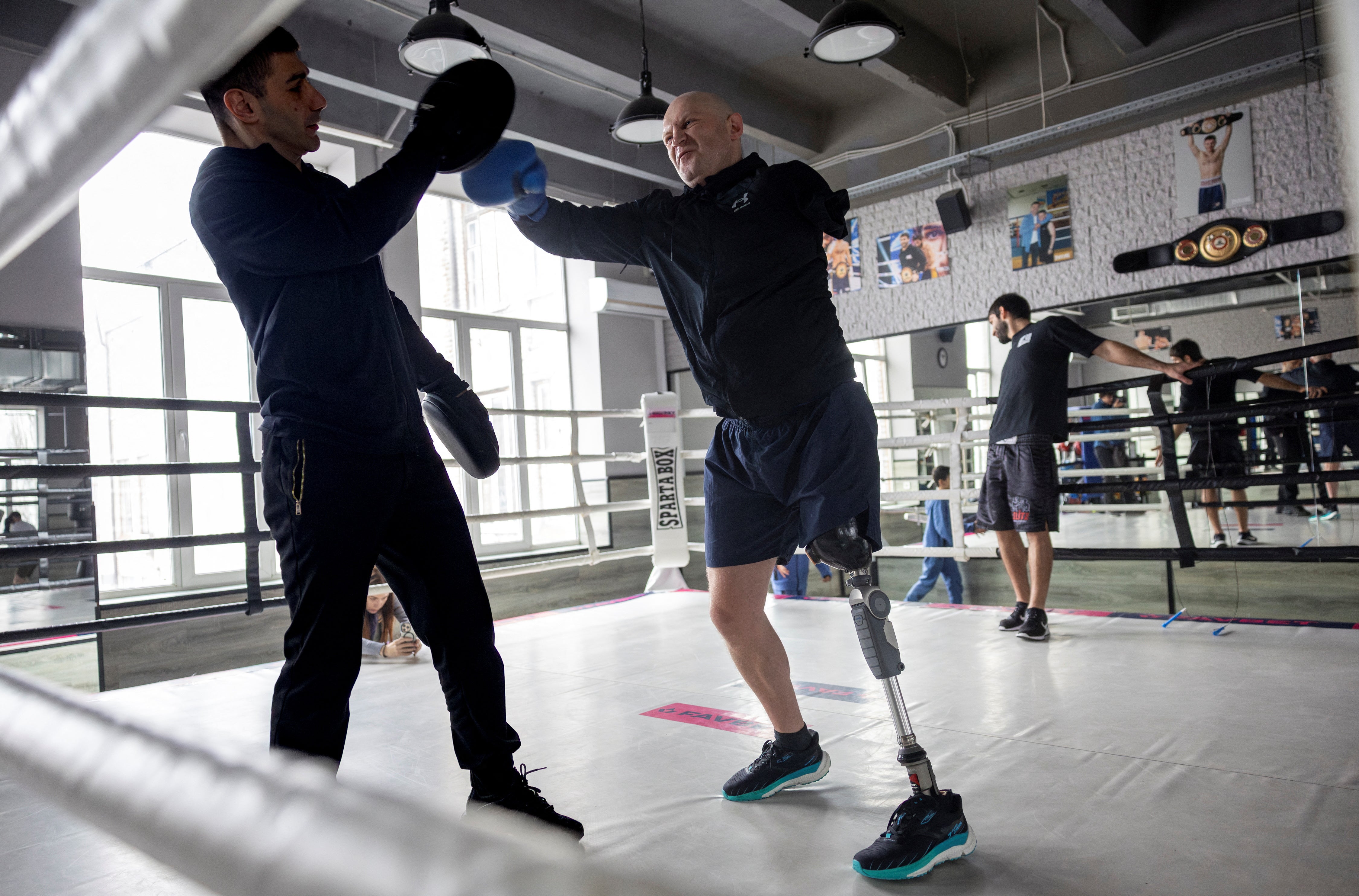
Convincing top brass that he still had a military role to play was not easy. Mango said he had to ask his commander to submit a report to the authorities confirming that there was a suitable position for him in the unit.
“At every medical check-up, there was always one surgeon who would ask if I had reconsidered my decision, and each time I said ‘No’,” said Mango, who’s hoping to have a bionic hand fitted to allow him to use artificial fingers.
In some ways, said the amputees interviewed, those who don’t return to the military find the transition to civilian life even harder to navigate.
Leaving the army means negotiating a new set of challenges, from getting around a town or apartment to finding a job, as well as dealing with civilians who don’t always know how to act when they come into contact with amputees.
The government provides high-quality prosthetics to those who lose limbs in combat as well as rehabilitation treatment. War amputees also receive payouts that vary according to the severity of the injuries. There is money available for servicing artificial limbs and individuals can raise funds privately or through charities for advanced prosthetics such as bionic hands.
Nayyem, of soldiers’ rights group Pryncyp, said the government was not doing enough to support amputees as they seek employment and that those initiatives that did exist were focused on the big cities.
“I mean, the state prioritised sending you to die, but didn’t make it a priority to help you recover when you got injured,” he said. “All the wounded feel this.”
He added that the number of people affected by amputations, either directly or indirectly, would only climb as the war ground on with no end in sight.
Ukraine’s Veteran Affairs Ministry, which oversees amputees, didn’t respond when asked about criticism that it was not doing enough to support amputees, particularly over the longer term.
Oleksandr Revtiukh lost his left arm and most of his left leg in multiple mine blasts while fighting Russian forces during last summer’s counteroffensive in the south, making a return to combat virtually impossible.
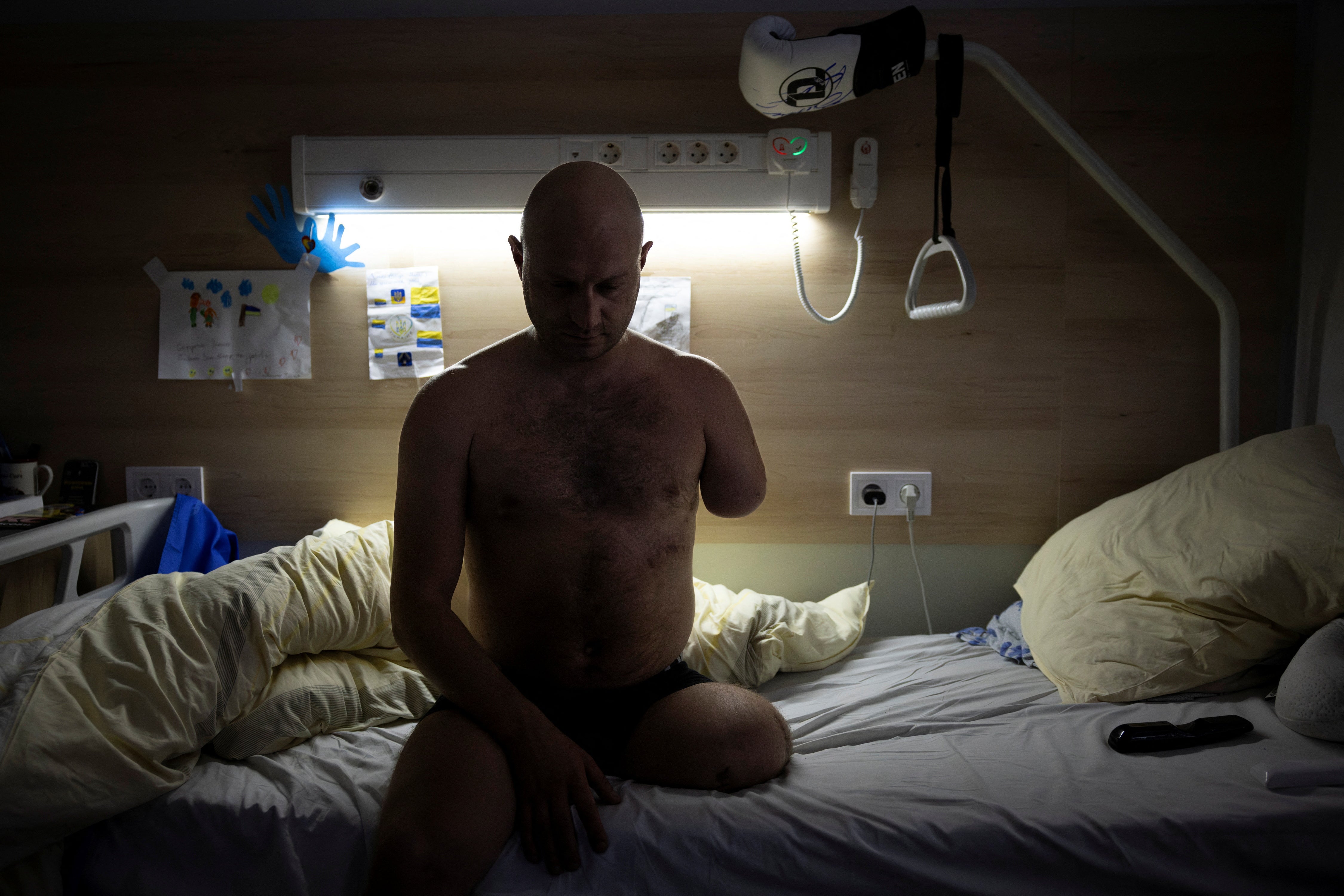
While the traumas of the war remain, the 33-year-old is focusing on his future outside of the military. The former electronics technician, who enlisted to fight months after Russia’s February 2022 invasion, wants to build a social media profile as a motivational boxing coach for fellow amputees.
“Don’t be afraid to make mistakes,” he said. “Look for a way out, there is a path through the thorns to the stars. This is my motto.”
One Ukrainian war amputee’s return to civilian life
By Thomas Peter
Oleksandr Revtiukh fires a vicious hook at the seasoned fighter facing him. He’s in the boxing ring, eight months after losing his left arm and most of his left leg in mine blasts while fighting in Ukraine.
Revtiukh follows with a snarling jab. His old life is gone. Only two years ago he had enjoyed a comfortable civilian life as an electronics technician abroad, before he returned to Ukraine to sign up and fight the Russian invasion.
A furious uppercut, bellowing with the effort. The war has left trauma. Now he has to accept what has happened to him and learn to live without his lost limbs.
“It’s like being a newborn child,” the 33-year-old says during a break in training at a gym in the Ukrainian capital Kyiv. “You’ve got to get to know the world from scratch.”
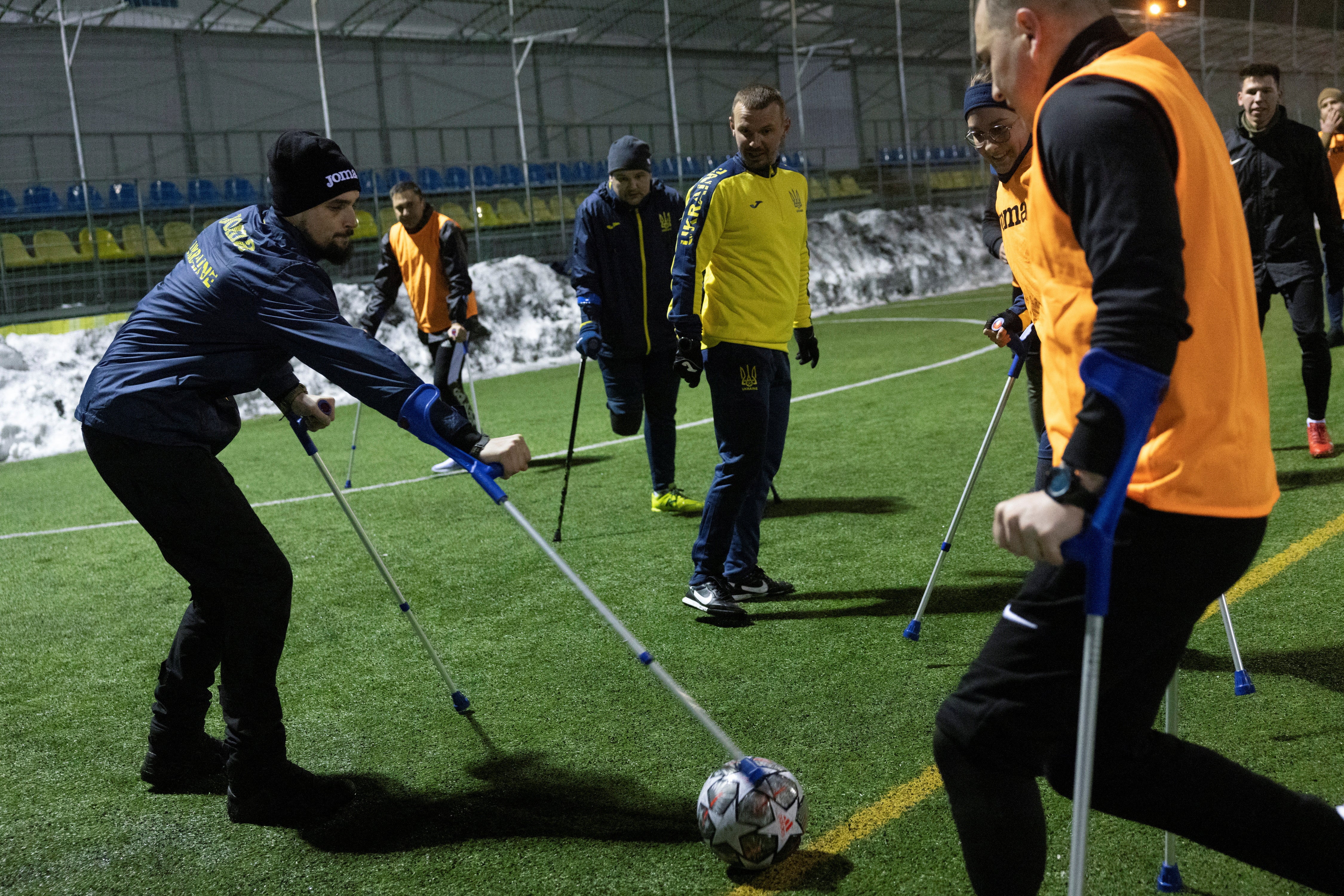
Revtiukh, who has a prosthetic leg, is one of tens of thousands of Ukrainian combat amputees who are having to adapt to a new life as civilians or back in the military.
His sister Natasha films the sparring session with leading Ukrainian boxer Aram Faniyan, to upload to her brother’s social media accounts where he’s trying to make his name as a motivational coach for others in his position.
“I can’t be afraid to make mistakes,” Revtiukh told Reuters. “Look for a way out, there is a path through the thorns to the stars. This is my motto.”
Revtiukh, who left a well-paid job in Hungary in April 2022 to return to fight in Ukraine, lost his arm and leg in June last year during the summer’s counteroffensive, and narrowly cheated death. He benefited from the support of his family as he underwent surgery and rehabilitation provided by the state.
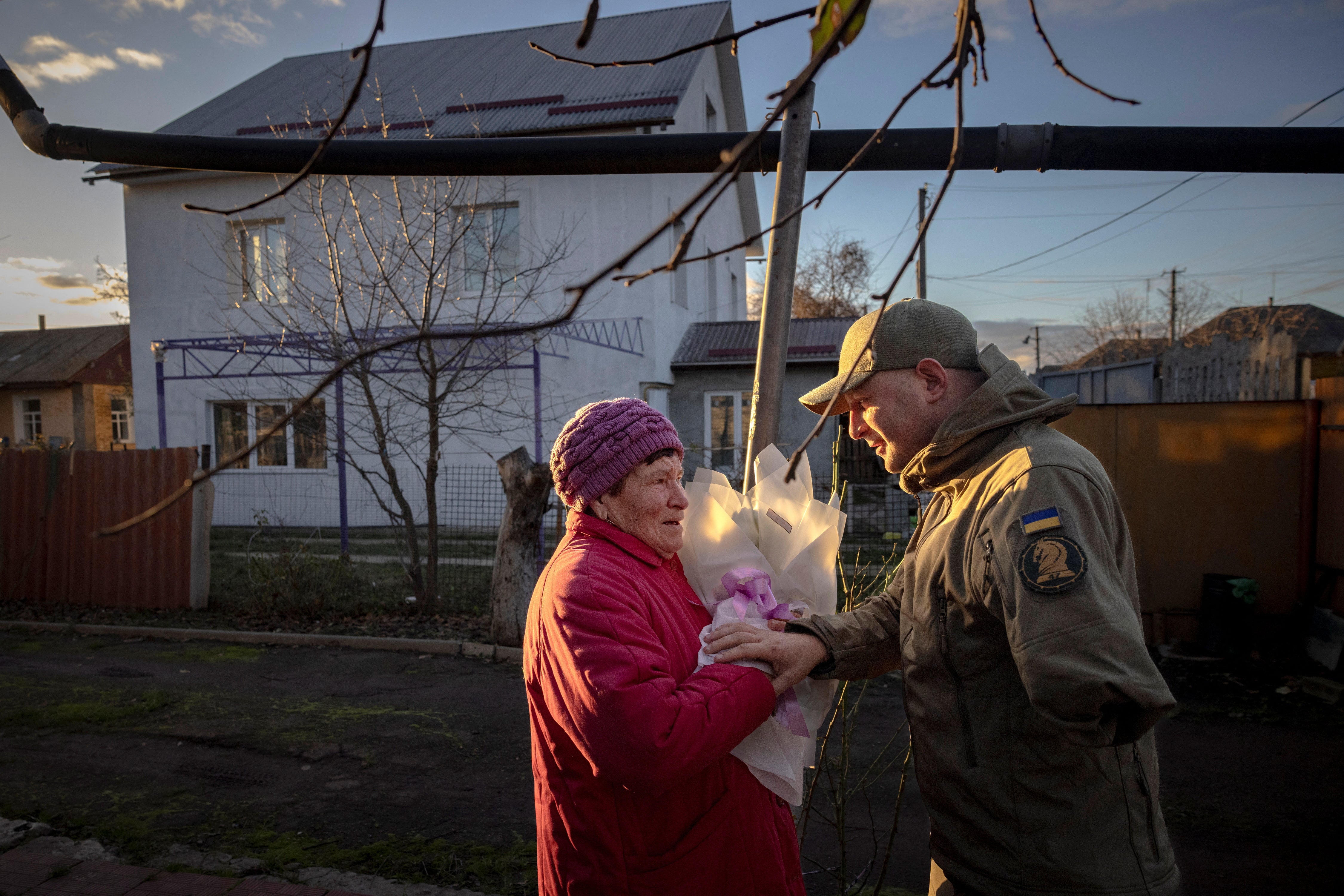
As for what comes next he must make his own way, in a country where many amputees say that budget constraints, social taboos and a lack of job opportunities are making that transition more difficult.
Ex-soldier and lawyer Masi Nayyem, co-founder of Pryncyp, a human rights organisation representing soldiers, estimated that between 20,000 and 50,000 soldiers had become amputees in Ukraine since Russia’s full-scale invasion in February 2022.
Official figures are not published and are considered sensitive by the military, but as the war drags into its third year with no end in sight, the numbers will only grow.
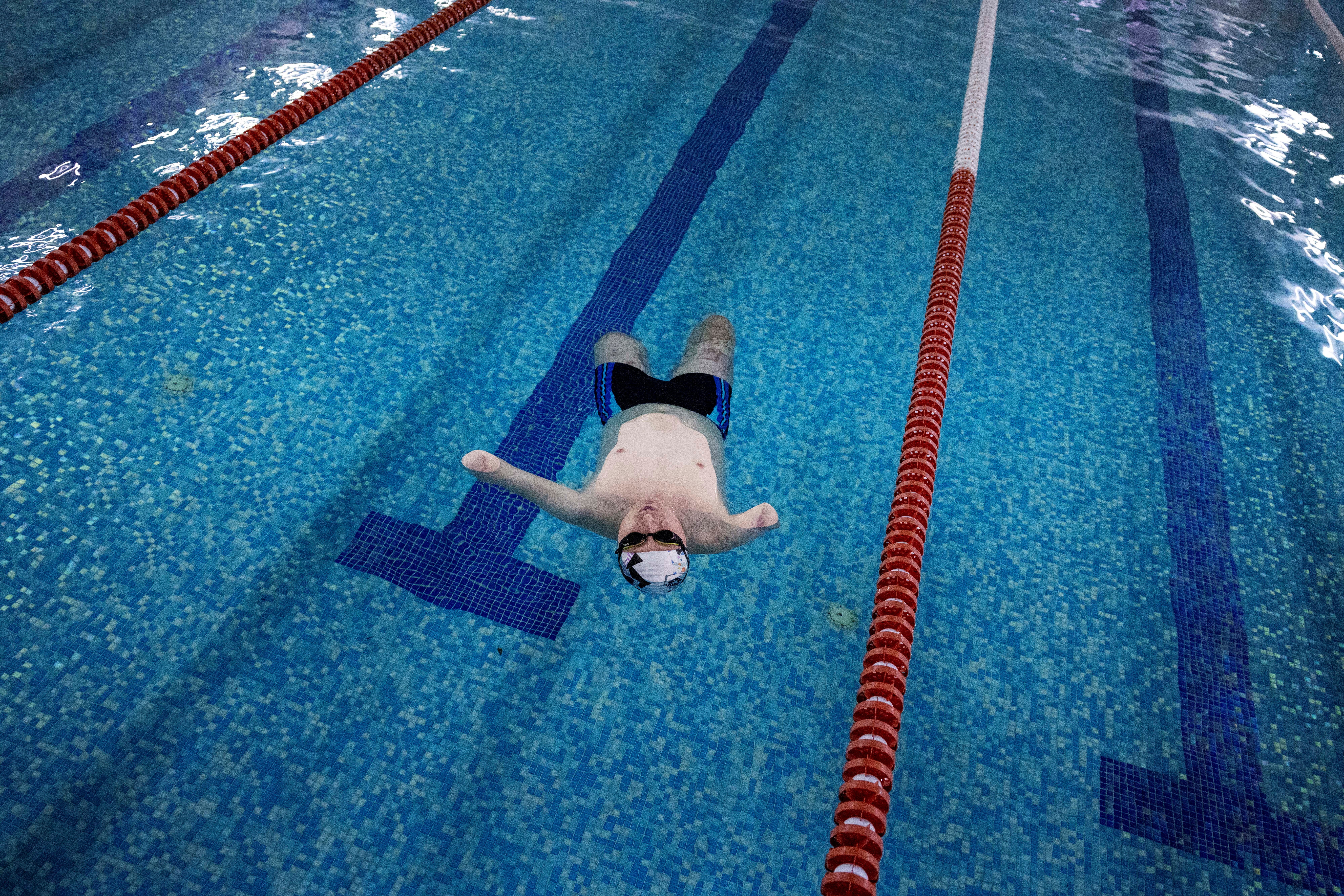
Nayyem said there were too few jobs available for the wounded, and that most initiatives to help them were in cities, leaving maimed soldiers in rural areas and small towns stranded.
“If a person is not integrated, what will they become? They will be depressed, and they will not be able to earn money.”
Ukraine’s Veteran Affairs Ministry, which oversees amputees, declined to give official data on the number of soldiers who had lost limbs. It did not respond to such criticism that it wasn’t doing enough to support amputees once they reentered society after receiving initial hospital rehab with prosthetic limbs.
Rostyslav Prystupa, a former soldier partially paralysed after a piece of shrapnel hit his spine while fighting in Mariupol, said he was mindful that veterans also had to learn to support themselves in civilian life.
“When you keep doing everything for people, they won’t learn to do it themselves,” he added. “You’re not going to do everything for them their whole lives. Someday I’ll have to do it myself, and then I won’t be able to, and no one will be there.”
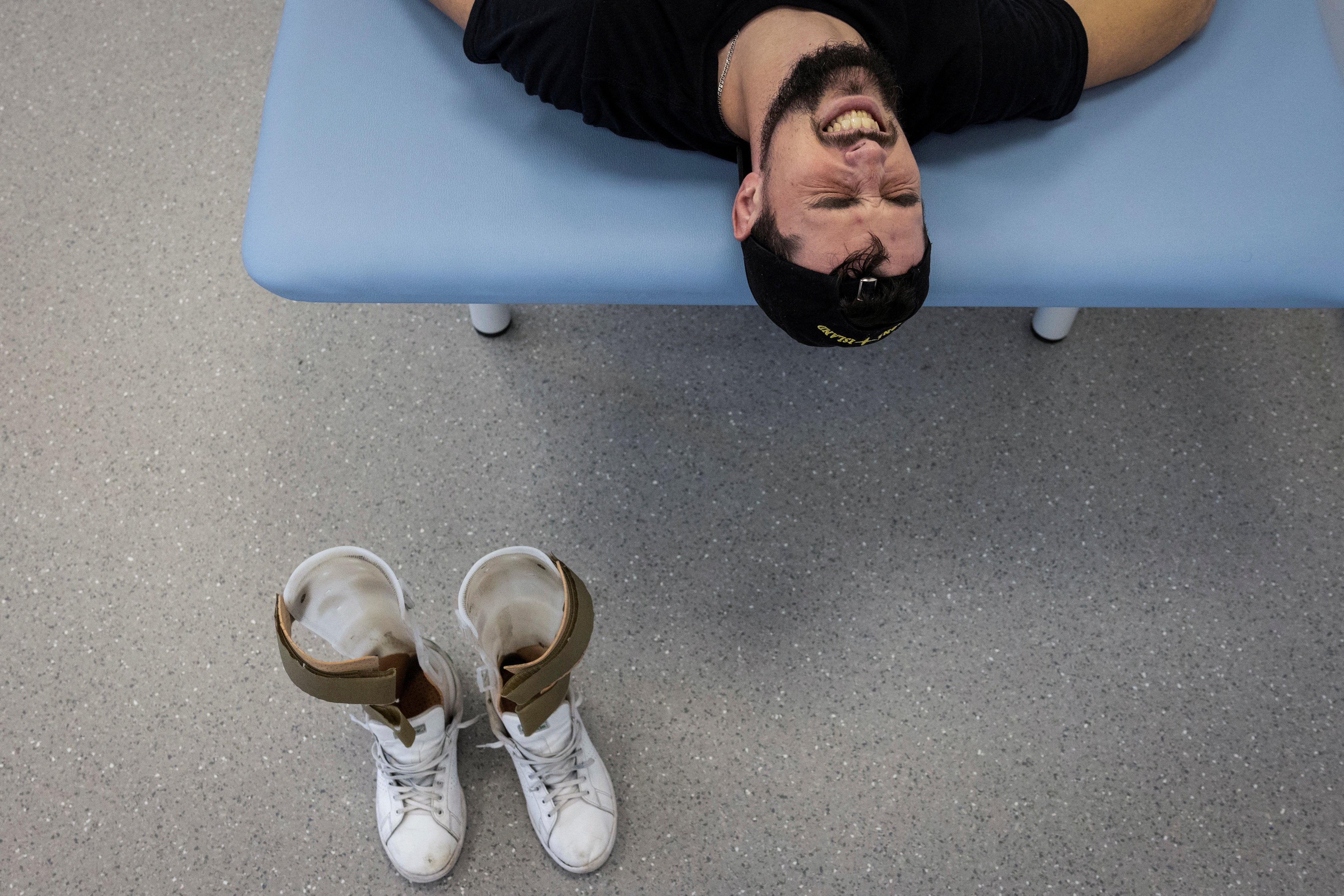
Revtiukh is close to his family, and recently visited his parents’ home in Nizhyn, northeast of Kyiv. Waiting outside, his grandmother wept as she embraced Revtiukh, whom she had not seen since his arm and leg were torn off in two separate mine blasts.
“My little Sasha. I thank God that you are alive,” she sobbed, using the diminutive of his first name.
Revtiukh described how he was wounded when he triggered anti-personnel mines during chaotic fighting to seize back territory from the Russians in the southern Zaporizhzhia region.
He recalled nearly suffocating from the dirt and shrapnel in his mouth after one explosion, but a fellow soldier, a 22-year-old named Gleb who was also wounded, cleared his airways and saved his life.
As Revtiukh begins his journey into civilian life, the boxing enthusiast is, for now, trying his hand at motivational coaching and ultimately he plans to become a history teacher in his native city of Nizhyn in northern Ukraine.
He has no regrets about the path he has taken, saying he and other veterans like him would set an example for the next generation.
“They’ll look to us as a model in the struggle for independence, freedom of speech and the preservation of human lives.”
Join our commenting forum
Join thought-provoking conversations, follow other Independent readers and see their replies
Comments